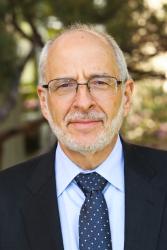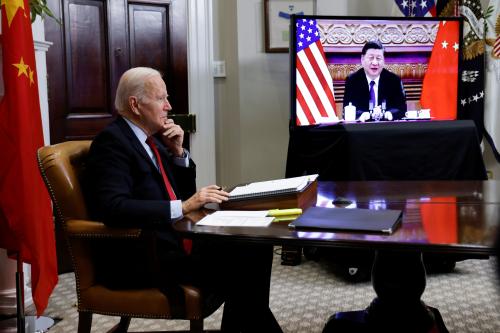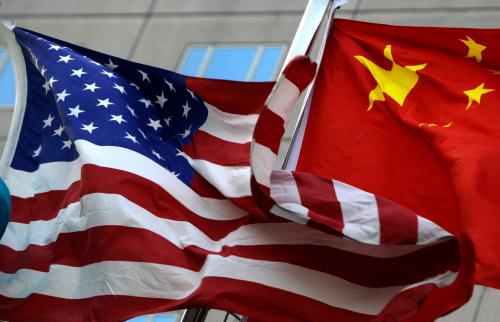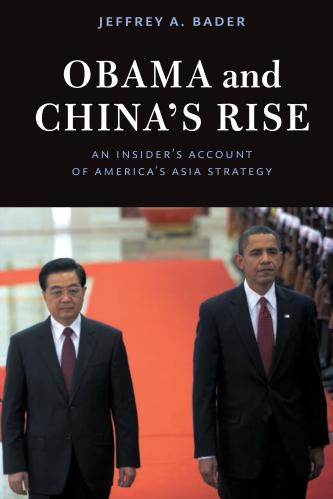Jeffrey A. Bader was a member of the Brookings community from 2005 until his passing in 2023, and was a dedicated public servant with a decades-long career spanning several administrations. You can learn more about Jeff’s work on U.S.-China relations here.
Ryan Hass
Jeffrey A. Bader passed away on Sunday, October 22, at the age of 78. With his passing, the world lost a towering figure in the field of China studies, and the Brookings Institution community lost a treasured colleague.
Jeff was a leading thinker of his generation on how the United States would relate to a rising China and bolster its leadership in Asia. While he openly acknowledged the United States’ imperfections, he believed deeply in American leadership as a force for good in the world. He also believed that if the United States was going to lead in the world, then it would have to strengthen its role in Asia, the engine of global dynamism for the 21st century.
Jeff cut his teeth in the China field by being involved in many of the most pivotal moments in the U.S.-China relationship over the past five decades as a diplomat. He participated in the process of normalizing U.S.-China relations in 1979 as well as the passage and implementation of the Taiwan Relations Act. He was engaged in diplomacy to curb China’s proliferation of weapons of mass destruction and their delivery devices in the 1980s, America’s reaction to the Tiananmen Square massacre in 1989, the Taiwan Strait crisis in 1995-96, the exchange of state visits between President Bill Clinton and President Jiang Zemin in 1997-98, and China’s accession to the World Trade Organization in 2001. In between these stints, Jeff served as U.S. ambassador to Namibia from 1999-2001. He also served as President Barack Obama’s principal Asia advisor throughout his 2008 presidential campaign and in the White House from 2008-2010.
Jeff valued pragmatism over ideology. Of his many strengths, patience for unidimensional thinking on China was not among them. Jeff opposed organizing foreign policy around banner headlines like the freedom agenda or the contest between democracy and autocracy. He was skeptical that outside actors could induce political change inside China, believing that any such future changes would result from forces within China, not from without. He viewed efforts to contain China as unserious, given that China already had fully integrated into the global economy and international system at the urging of every administration from Nixon to Obama. He took exception with suggestions that the United States could bring China to heel through military muscle, sanctimony on human rights, or economic punishments. By the same token, Jeff also opposed arguments that indulgence or accommodation could induce better Chinese behavior.
As he outlined in his memoir, “Obama and China’s Rise,” Jeff accepted that frictions were bound to arise in a relationship between the world’s dominant power and major rising power. He never lost sight of the fact that the United States and China had vastly different histories, cultures, interests, and values. The measure of sound policy, he felt, wasn’t stifling natural tensions between both powers, but managing them in ways that protected and promoted American interests and values.
Even as he was clear-eyed on the challenges, Jeff rejected fatalistic thinking about the inevitability of conflict between the United States and China. He often stressed that the United States’ enemies of the past century were rising powers with imperial ambitions (Germany, Japan, Italy, and the Soviet Union). United States’ strategy toward China must remain strong enough to deter any Chinese imperial impulses, while also keeping a path open for a future China that supports — and does not undermine — the international system.
Jeff believed that the United States and China ultimately would view each other in similar ways, either as primarily hostile or capable of coexistence. He was skeptical that the two sides would see each other profoundly differently. Partly for these reasons, he did not embrace American politicians and pundits who trafficked in problem-spotting and political point-scoring on China. He viewed such individuals mostly as soft-minded opportunists who privileged ambition over the United States’ efforts to manage its complex relationship with China.
He never lost sight of China’s contributions to the deterioration in U.S.-China relations. More than any other former U.S. official I have observed, Jeff was capable of eye-watering candor with Chinese counterparts about the mistakes he felt they were making in their domestic and foreign policies. His decades of fair-minded dealing with Chinese interlocutors granted him space to speak directly with his Chinese counterparts, and he felt a responsibility to use those opportunities to full effect.
In addition to being brilliant, Jeff also was generous in developing future generations of China hands. His legacy will live on in the many rising scholars and practitioners he mentored. He took pride in being the inaugural director of the Brookings Institution’s John L. Thornton China Center. He always wanted the center to prioritize the development of practical ideas for advancing U.S. interests. He was uncompromising on this point, even when some of his views fell out of fashion during the Trump administration and since.
As determined as Jeff was about strengthening American leadership, he was even more in love with his wife, Rohini Talalla. Together with their cats, Jeff and Rohini were inseparably close and Rohini was the center of Jeff’s world.
Jeff was fiercely loyal to friends, and they were to him in return. Below, please find several brief reflections from Brookings colleagues who worked closely with Jeff over many years:
Richard C. Bush
Jeff Bader had no illusions about China and its intentions, but he also believed in the value of shaping those intentions by incorporating China into the international system. He also understood that while some actors in the U.S. political system supported that vision, others would not. He dealt the hand he was played but deployed all his diplomatic skills — the ability to listen and explain, a skill at leveraging results, and a unique combination of grace and humor — to the positive development of U.S.-China relations. I suspect that in his final days, he regretted that forces opposed to a good relationship in both America and China had gained the upper hand, but he never abandoned the belief that our two countries, working together, could be a force for peace, prosperity, and the improvement of mankind.
Kenneth G. Lieberthal
Jeff Bader combined a strong moral compass with well-honed diplomatic skills and the empathy required to understand the sensibilities of those he was negotiating with. Add to these his astonishingly detailed and incisive recollections of events during his more than four decades of deep involvement in U.S.-China relations. Jeff was also a superb writer whether drafting reporting cables, briefing books, journal articles, or his excellent book, “Obama and China’s Rise.” All these skills, combined with his quick wit, made him a highly effective diplomat, scholar, and advisor.
When I joined the Clinton administration’s National Security Council, I was Jeff’s boss, but he was my mentor. I think that most who worked with Jeff, from presidents on down, have had the same experience.
Michael E. O'Hanlon
Jeff Bader was one of the kindest, smartest, and most conscientious colleagues I have had over three decades at Brookings. As a signature memory of his kindness, I remember well when the going got tough during the Clinton-Obama primary showdowns of 2008. Both of us served as policy advisor volunteers in that campaign, consistent with Brookings’s nonpartisanship guidelines, but on different sides, and there could be a bit of tension (to put it gently) between the two camps. Even though Jeff was on the winning side, he was always gracious to me. (He was, in fact, a key Obama advisor on Asia from the early days, yet also later wrote a very fair-minded book looking back on what Obama got right but also wrong in the early years of his presidency.)
On Jeff’s smarts — wow, I have never learned more from an Asia expert than from Jeff. He was at once very supportive of U.S. alliances, yet also very desirous of not overly stoking or unnecessarily worsening the relationship with Beijing. His sense of calm, historical perspective, strategic empathy (for all key regional actors, not just one), and his pithiness in condensing policy insights and proposals into well-articulated and cogent words were equaled by few and exceeded by none. Finally, I always admired his conscientiousness — his concern for the future of the world, above self or political party or individual U.S. administration. I know it concerned him to see where U.S.-China relations went in recent years. But I am also confident that he has left a legacy of younger, equally brilliant, equally conscientious Asia experts at Brookings and beyond that give the nation the tools to get through this tough period with China — and honor him in the process.
Jonathan D. Pollack
I was able to visit regularly with Jeff Bader until his final weeks. He knew his time was short, so there was little time for idle conversation. His intellectual convictions were unwavering. He remained true to the core beliefs animating his entire career, and he could be severely critical of U.S. policies with which he disagreed. We last met for lunch just before he was again hospitalized, and then spoke briefly a few days later. Jeff’s death leaves a gaping hole for all of us. May his memory be a blessing.
The Brookings Institution is committed to quality, independence, and impact.
We are supported by a diverse array of funders. In line with our values and policies, each Brookings publication represents the sole views of its author(s).











Commentary
In remembrance of Jeffrey A. Bader
October 31, 2023